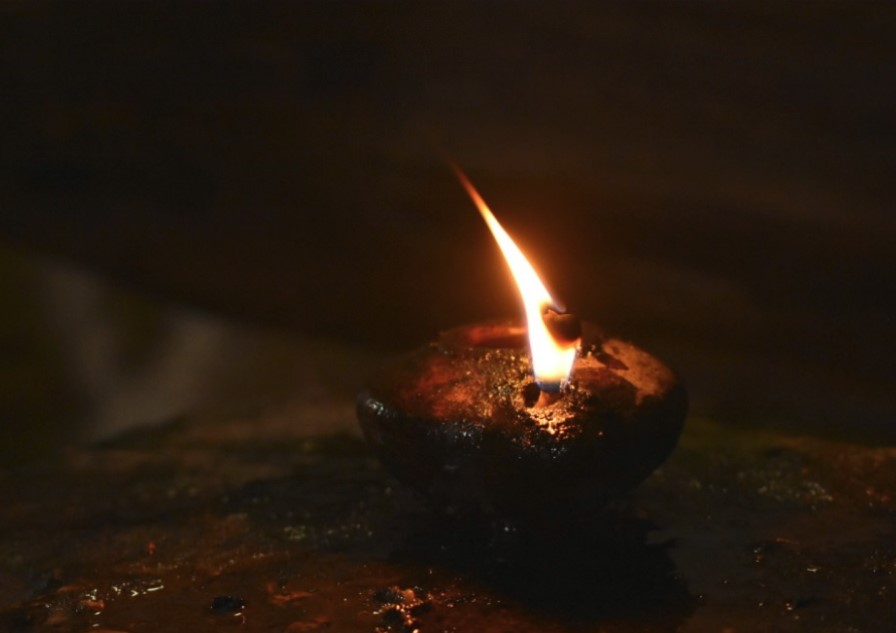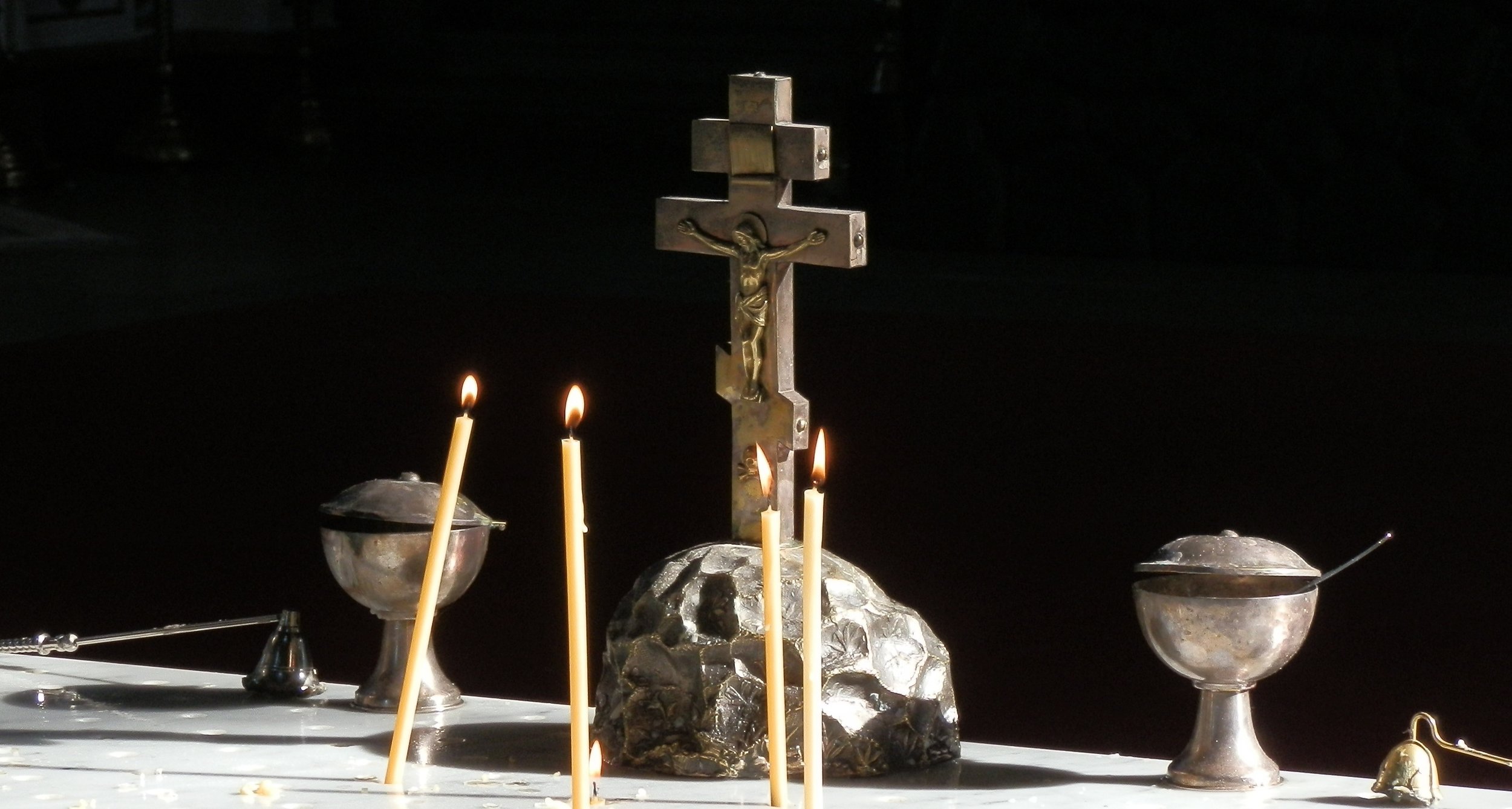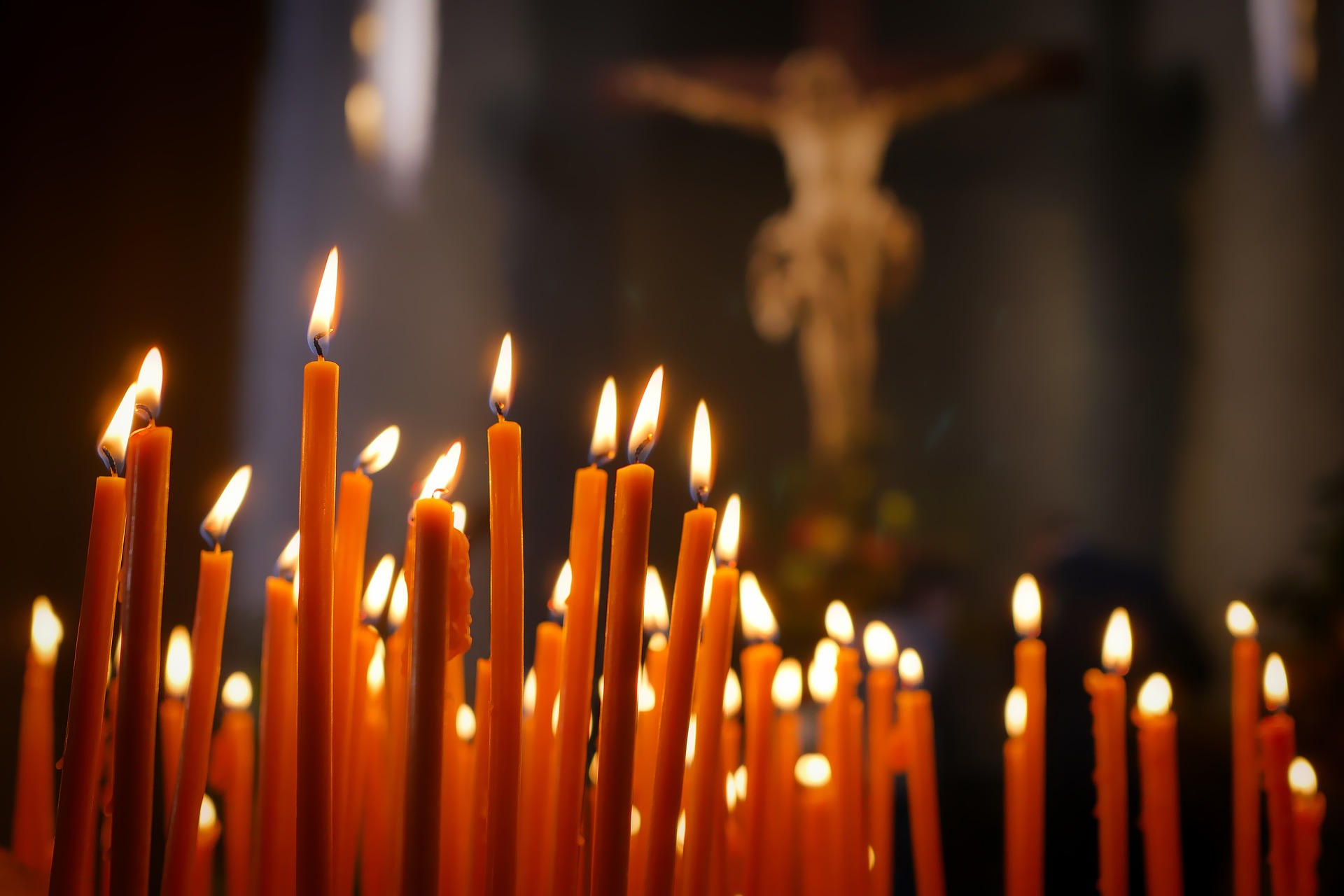Healing Atonement
The Roman Catholic Tradition
Photo credit: fietzfotos / 858 images | Public Domain, Pixabay.
Introduction
These resources explore the meaning of Jesus' death, from the understanding of the Roman Catholic tradition. Jesus is God's way of undoing human evil, in a personal, loving way. His death was the climax of his victorious struggle over the corruption in his own human nature. We call this "Medical Substitution," although it has gone by other names.
Other Resources on Medical Substitutionary Atonement in the Roman Catholic Tradition
Verona / Leonine Sacramentary: “God, you who marvelously created the dignity of human substance and more marvelously reformed it: grant us, we ask, to be sharers in the divinity of your Son, Jesus Christ, who deemed it worthy to become a partaker of our humanity” (Ve 1239) — this prayer is significant because the Verona Sacramentary is the oldest surviving liturgical book of the Roman rite, containing prayers for mass. It is called “Leonine” because tradition ascribes at least some of the collection to Pope Leo I, who died in 461 AD. This prayer was maintained in the Anglican Book of Common Prayer — see Sources of Atonement Theology: Protestant.
John Scotus Eriugena (c.800 - c.377), Periphyseon.
Through sin our nature has become tarnished
It no longer bears the likeness of God
Likeness brings us nearer to God
Unlikeness removes us to a distance
However, it is not by paces of the foot
That we move towards or away from God
Rather we move closer or further
By the affections of our minds
The light of the sun is not lost because of distance
We lose its light when we close our eyes
It is not space which separates us from health
We are separated from health by our pain
It happens in exactly the same way
When we leave behind the virtues
Of life, blessedness, and wisdom
Sin is the emptiness where they once were
In the same way that skin is infected with leprosy
So human nature is infected with sin
In this illness the soul ceases to resemble
The likeness of Jesus Christ its maker
When the soul is cured of that leprosy
By the medicine of the Divine Grace
It will be restored to its former beauty
And I will tell you one thing more
The nature which is created in the image of God
Never truly lost the blossom of its beauty
Nor did it lose the integrity of its essence
Nor could such a thing ever happen.
See 4 minute reflection by Justin Coutts, The Mirror of the Heart. In Seach of a New Eden blog, Jun 26, 2022.
Vespers Hymn.
O Lord Most High, eternal King,
By you redeemed, your praise we sing.
The bonds of death are burst by thee,
And grace has won the victory.
Ascending to the Father's throne
You claim the kingdom as your own;
And angels wonder when they see
How changed is our humanity.
You are our joy, O mighty Lord,
As you will be our great reward;
Let all our glory be in thee
Both now and through eternity.
O risen Christ, ascended Lord,
All praise to you let earth accord,
Who are while endless ages run,
With Father and with Spirit, One.
New Advent, Doctrine of the Atonement (New Advent website) from Nicaea to Trent — argues for unlimited atonement in a medical, not retributive, sense.
New Catholic Encyclopedia, Satisfaction of Christ (Encyclopedia.com) on Anselm as interpreted by Aquinas
Catena Aurea, Gospel of Matthew ch.27 (Christian Classics Ethereal Library website)
Bonaventure (AD 1221–1274), Dominica prima in quadragesima. Servo 1 (IX, 215-219), as quoted by Zachary Hayes, “Christ, Word of God and Exemplar of Humanity: The Roots of Franciscan Christo-centrism and Its Implications for Today,” The Cord 46.1 (St. Bonaventure University: 1996), 13.
“As a human being, Christ has something in common with all creatures. With the stone he shares existence; with plants he shares life; with animals he shares sensation; and with the angels he shares intelligence. Thus all things are transformed in Christ since—in his human nature—he embraces something of every creature in himself when he is transfigured.”
For a short article on Bonaventure, see Richard Rohr, Transformation. Center for Action and Contemplation, Jul 6, 2016. Jesus’ connection to all creation is very important to consider, when we grasp his impact on all creation in atonement.
Joseph Cardinal Ratzinger, Introduction to Christianity (online quote, from p.231 - 234 and p.281 - 282) where he affirms the Eastern view of atonement as continuous with the early church, and critiques Anselm's satisfaction of honor theory.
David G. Hunter, Helvidius, Jovinian, and the Virginity of Mary in Late Fourth-Century Rome. Journal of Early Christian Studies 1:1, 47 - 71, 1993 | The Johns Hopkins University Press. Helvidius and Jovinian were fourth century writers who criticized the deployment of Mary to bolster the Christian vocation of celibate monasticism in an unjustifiable way, considering history and theology. Of great interest here is the negative view of sexual intercourse even within marriage. Origen and Ambrose both associate Mary’s virginity at conception as deflecting the sin associated with sexual intercourse from herself and Jesus. This is of great importance in theological anthropology and the distance that church moved from synagogue.
Thomas G. Weinandy, In the Likeness of Sinful Flesh: An Essay on the Humanity of Christ. T&T Clark | Amazon page, Dec 2000. See also (pdf book)
John Richard Neuhaus, Challenging a Giant. First Things, Apr 2006. On Alyssa Helene Pitstick challenging Hans Urs Von Balthazar's idea of Christ's penal suffering in hell.
Eleonore Stump, "Aquinas on the Atonement" in Michael C. Rea, Oxford Readings in Philosophical Theology: Trinity, Incarnation, and Atonement. Oxford University Press, 2009. Chapter 13. (pdf book).
Bryan Cross, Aquinas and Trent, Part 5. Called to Communion, Apr 6, 2009. Regarding "debt of punishment" - for reference, to ponder.
Dave Armstrong, Theology of the Atonement: Catholic Distinctiveness Over Against the Calvinist Penal Substitution Model. Biblical Evidence for Catholicism blog, Apr 23, 2009.
Bryan Cross, Catholic and Reformed Conceptions of the Atonement. Called to Communion blog, Apr 1, 2010.
Eleonore Stump, The Value of Atonement. Center for Philosophy of Religion, Jul 8, 2010. From 6 min mark; note parts 2 - 9 (part 4 highlights what I consider to be a flaw in Aquinas' understanding of atonement.
Catholic Nick, More Problems With Penal Substitution. Nick's Catholic blog, Jul 7, 2010.
Catholic Nick, Protestant Apologetics Site "GotQuestions?" Says Jesus "Spiritually Died" on the Cross. Nick's Catholic blog, Mar 28, 2014.
Catholic Nick, Does the Catholic View of Atonement Permit the Reformed View of Penal Substitution? Nick's Catholic blog, Apr 2, 2014. Although Michael Taylor critiques Nick for not distinguishing sufficiently between them, which I believe gets at some of the tensions in Catholic theology on the atonement.
Catholic Nick, Understanding Jesus' Cry of Dereliction. Creed Code Cult, Mar 28, 2015.
Catholic Nick, Penal Substitution is the Key to Understanding Protestant Evangelicalism. Nick's Catholic blog, Apr 4, 2015. A good assortments of quotes
Brandon Peterson, Paving the Way? Penalty and Atonement in Thomas Aquinas' Soteriology. Academia, Mar 2012.
Kevin Davis, Did Christ Have a Fallen Human Nature? Dogmatics blog, Nov 4, 2015. Compares T.F. Torrance and Thomas Aquinas
Christopher D. Jackson, Catholics Are Adopting a Lutheran Perspective on Martin Luther. They Shouldn't. First Things, Jul 22, 2016.
Eleonore Stump, Atonement. Loyola Productions Munich, Jul 2, 2018. A six minute video.
Elizabeth A. Johnson interview, No One Had to Die for Our Sins. U.S. Catholic, Nov 27, 2018. Acritique of Anselm’s satisfaction theory
Jared Ortiz, How Catholics Have Always Believed and Taught Deification. Public Orthodoxy, Aug 6, 2019.
The Cordial Catholic, The Most Incredible Catholic Case for Atonement (w/ Dr. Margaret Turek). The Cordial Catholic, Jul 6, 2022. A delightful 90 minute conversation, video.
Matt Fradd, What Calvinists Get Wrong About Atonement w/ Dr. Scott Hahn. Pints with Aquinas, Dec 1, 2022. A 10 minute video rooted in Aquinas’ and Anselm’s theory of the vicarious satisfaction of God’s honor, where self-sacrifice is the highest expression of love and God’s character.
Denial of the Immaculate Conception of Mary Herself
Augustine (354 - 430 AD) says Jesus voluntarily assumed corruptible flesh from the fallen flesh of the Virgin Mary. He locates “her conception” as the origin of Mary’s “flesh of sin.” Here is the relevant section: “Accordingly, the body of Christ was truly assumed from the women’s flesh, which [is] from her flesh [of] sin propagated [from] her conception. Nevertheless, because [His body] does not follow her conception in this [same] way, [He] is not her flesh [of] sin, but [the] likeness [of the] flesh [of] sin.” (Augustine, Book of Genesis, Book 10 Chap 18/Par 32, Migne PL34: p. 422).
Pope Leo 1 (440 AD) "The Lord Jesus Christ alone among the sons of men was born immaculate." (Sermon 24 in Nativ. Dom.)
Pope Gelasius (492 AD) "It belongs alone to the immaculate lamb to have no sin at all." (Gellasii papae dicta, vol. 4, col 1241, Paris, 1671)
Bishop Fulgentius of Respe (462 - 533 AD) “Truly, [the] likeness [of] flesh [of] sin [is] within God’s Son, or rather it is said God’s Son [is] in [the] likeness of sinful flesh, it is believed the only begotten God from [the] Virgin’s mortal flesh did not extract sin’s defilement. But, I accept [the] true nature [of God] completely, as Truth risen from [the] earth, standing out [in] that prophet David’s happy saying, [which] get’s [to] state: “Truth is risen from the Earth.” Truly, therefore Mary conceived God’s Word, because in flesh [of] sin she gave birth, in that way God accepted [the likeness of sinful flesh].” (Epistle 17, Par 13, Migne PL 65, p. 458)
Pope Innocent III (1216 AD) "She (Eve) was produced without sin, but she brought forth in sin, she (Mary) was produced in sin, but she brought forth without sin." (De festo Assump., Sermon 2)
From Ludwig Ott's Fundamentals of Catholic Dogma (1962): "Greek Fathers (Origen, St. Basil. St John Chrysostom, St Cyril of Alexander) taught that Mary suffered from venial personal faults, such as ambition and vanity, doubt about the message of the Angel, and lack of faith under the Cross."
Luigi Gambero, Mary and the Fathers of the Church: The Blessed Virgin Mary in Patristic Thought. Ignatius Press | Amazon page, 1999. A Catholic Marian scholar, Gambero tells the story of Christian thought on Mary from the New Testament to the Middle Ages. However, Gambero demonstrates how uninterested the Pre-Nicene Fathers were in Mary, in his exhaustive collection of patristic references to Mary in the first half of his book. In the second half, Gambero notes how this changed around 400. But he downplays the discontinuity.
David Lyle Jeffrey, Hail Mary. Christianity Today, Issue 83.
Craig Truglia, Augustine and Fulgentius of Ruspe Contradict the Immaculate Conception. Orthodox Christian Theology, Aug 14, 2020.
Joshua Schooping, Irenaeus' High Mariology: What it Does Not Prove. Reformed Ninja, Oct 9, 2021.
Sources of Atonement Theology
These resources explore the foundation of “Medical Substitution” as the best understanding of the Bible, and the original understanding of the church. There are also links to books, web articles, etc. from representatives of the three broad Christian traditions.





